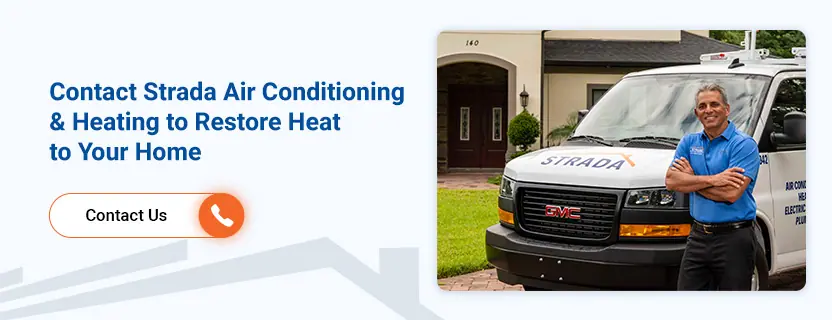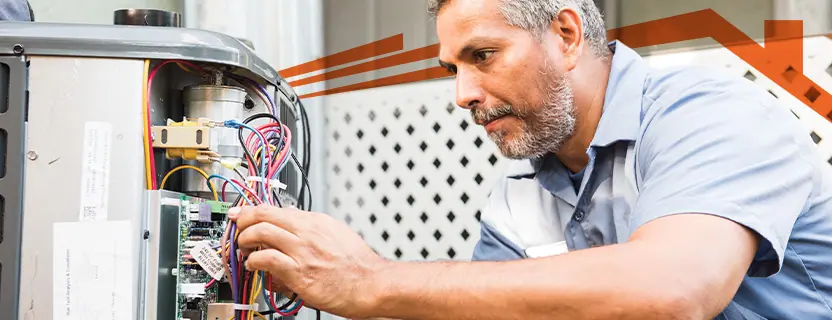
As the weather in the southeast states moves from warm, humid summers to cooler winters, your home’s heating system will shield you from the outdoor temperatures. But if you’ve tried to warm up your home only to realize your heater is not working, there’s no need to fret. Before scouring the web to find out how much a new heater installation costs, you might be able to fix the system instead.
We’ll explore the common reasons your central heater is not working and how to troubleshoot heating system problems.
Home heating systems can fail for a variety of reasons. These systems have several working parts that endure wear and tear over time. The air filters and ducts, thermostats and heat exchangers are some of the components that can cause problems when worn or damaged.
While some faults are quick to fix, others require a professional technician’s skills and expertise. Here are the most common culprits of heaters that won’t work:
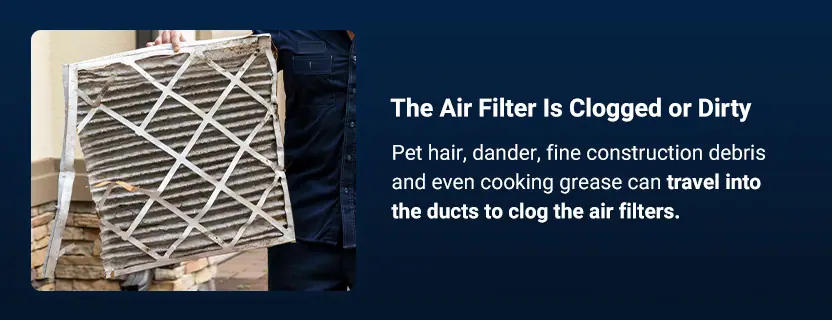
Clogged and dirty air filters are one of the most common reasons heaters stop working. The air filters on a heating system work hard to keep pollen and dust out of your home. These particles build up over time, letting less and less air pass through. While dirty air filters are pretty easy to spot, it’s harder to tell if there is a clog.
Pet hair, dander, fine construction debris and even cooking grease can travel into the ducts to clog the air filters. When this happens, your heater won’t effectively warm your home and may not work at all.
Whether you have a smart or regular thermostat, this component controls the entire heating system. Thermostats make it possible to regulate indoor temperatures by sending signals to the unit to turn on and off. If your heater is not working, you should always check the thermostat first. If the thermostat is responsive, but indoor temperatures don’t fluctuate when changing the heat settings, it may be faulty.
Some common reasons thermostats fail are dirt and debris build-up, wiring issues and drained batteries. The device could also be outdated or located too close to a heat source. If the thermostat is near heat, it will get warmer than the rest of the room and send the wrong signals to the heating system.
A fuse box is an electrical component that consists of wires and a fuse. It’s usually in the lower compartment of the furnace. If the fuse is faulty, the furnace won’t work. While fuse boxes can last decades without any problems, they can blow for various reasons, such as when a larger-than-normal amount of energy surges through. It could also blow due to a short circuit, damaged wiring, moisture build-up and circuit breaker issues. When the fuse blows, you may notice a burnt smell.
If the furnace does not receive gas, it won’t be able to generate heat to move through your home. Sometimes you can locate the gas valve and turn it back on. But if the valve is on, there could be a leak, or the gas lines could be blocked. Otherwise, the gas valve can malfunction.
A strange hissing noise is a sign of a gas leak from a furnace. In this case, shut the furnace off, ventilate the room and immediately and contact a professional technician.
Heating system ducts can also become blocked with dander and dust build-up. While dirty air ducts can lead to other problems in the system, clogged ducts won’t allow air to pass through. Instead, the air flows through to the next available duct. In this case, some rooms of your home may be freezing while others are warm.
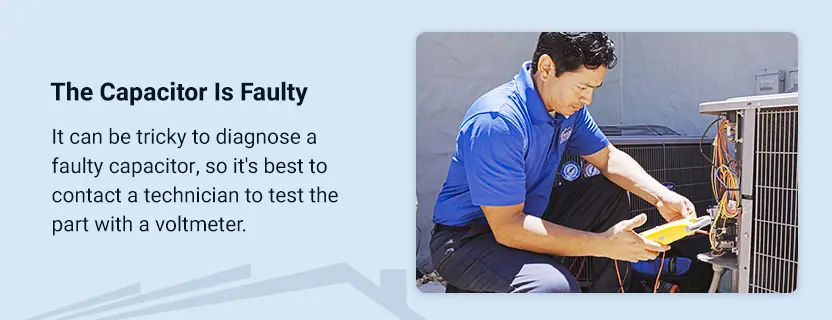
The blower capacitor powers the fan’s motor. It encourages air to move through the system. The furnace won’t turn on without a capacitor. If the component is damaged, the blower may run slower or inconsistently. It can be tricky to diagnose a faulty capacitor, so it’s best to contact a technician to test the part with a voltmeter. It’s not possible to repair this component. If it is the culprit causing your heater not to work, you must replace the part with a new one.
The heat exchanger transfers heat between gas or liquid. These parts are built to last, although they can crack over time. A cracked heat exchanger might not affect the heating system right away but will cause a loss of heating efficiency over time and can eventually cause the furnace to malfunction.
The symptoms of a cracked heat exchanger include yellow instead of blue flames, little airflow, insufficient combustion and a strong pickle-like odor.
A cracked heat exchanger can’t be repaired or replaced in a gas heating system. Replacing this component increases the risk of carbon monoxide leaking into the home. Even if this risk is managed well by a trained technician, replacing this part can be costly. It’s often best to replace the furnace.
However, you can typically replace the heat exchanger if you have an electric system like a heat pump or an electric furnace. Heat pumps generate heat through a different process, and because they don’t use gas, replacing this part is not as risky.
The furnace exhaust flue can become blocked with debris. If the flue is blocked, gases and fumes have nowhere to go, and carbon monoxide and other gases from the heating system can seep into your home.
If the furnace heats up only briefly before shutting off or doesn’t produce any hot air, the flue might be blocked. An unpleasant odor and a hot front door panel on the furnace are other signs of a clogged flue.
While furnace heating systems have chimney flues, heat pumps don’t need ventilation.
Now that you have a better understanding of what could be wrong with your heating system, you can try to troubleshoot the problem independently. Once you have identified the problem, you can communicate the issue to an expert technician. Letting the technician know what the problem might be can help them prepare for the repair work and get the job done quickly.
Here’s how to troubleshoot a heater that’s not working:
If you can’t diagnose the problem with these steps, contact a heater technician to troubleshoot and repair the issue for you.
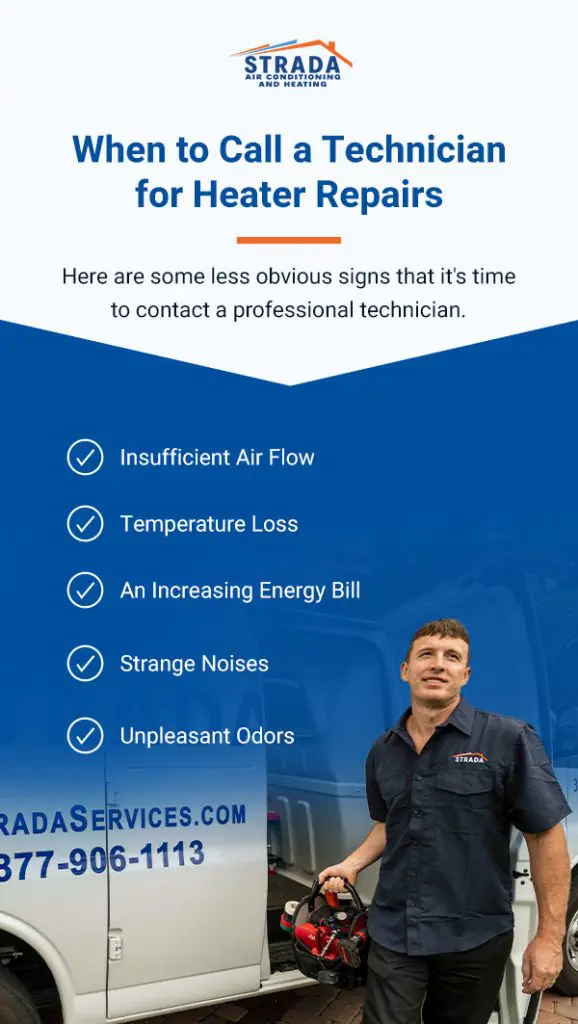
Some signs of a failing heating system are less noticeable than others. While it’s easy to tell the unit is not working if it’s not heating your home, here are some less obvious signs that it’s time to contact a professional technician. Whether you have an electric or gas heater or a heat pump in your home, professional technicians know how to repair all kinds of heat systems.
If your heating system is working but struggling to push air out, the filter or ducts might be blocked. However, the issue could be a bit more complicated, so contacting a technician is vital.
The thermostat or furnace could be faulty if your unit blows cold air instead of warm air. Some thermostat and duct issues can cause hot and cold spots throughout a home. If the system is too small for the size of the house, the unit will need to run longer to achieve suitable temperatures. A heating system may also run longer if it needs a maintenance service.
A heating system under strain due to capacity or neglected maintenance will run longer, consuming more energy. An increase in energy usage is one of the first signs a heating system is starting to fail. While the spike in energy usage is often high, homeowners might struggle to figure out where the increase in usage is coming from. A technician can help you solve the issue if your heating system is the culprit.
Heating systems make soothing humming sounds while running and occasionally make odd sounds due to normal expansion and contraction of the interior ductwork. But some noises are a sign that the system is failing. Loud banging can stem from a malfunctioning ignition, air trapped inside pipes or a dirty heat exchanger. The ball bearings need lubrication or replacement if your unit makes grinding sounds.
Squealing or squeaking and rattling noises are also calls for concern. A squealing heating system might indicate that the fan or fan belt is damaged, and rattling sounds can occur when parts loosen within the furnace. It’s best to contact a heater technician if you notice any of these sounds coming from your heating unit.
Whether you have a gas or electric home heating system, unpleasant odors are always cause for concern. In electric heating systems, odd smells can alert a blown fuse of an overheating motor.
Strange smells associated with gas heating systems are just as alarming. While gas leaks are rare in newer heating system models, if you notice a rotten egg smell in your home, turn the furnace and thermostat off and contact a technician right away. Strada Air Conditioning & Home offers 24/7 online scheduling. We’ll provide expert guidance so you can have peace of mind regarding any strange smells coming from your heating system.
Beyond enduring the freezing temperatures in winter, it’s essential to prioritize repairs to prevent further damage to the heating system. When minor repairs are left too long, various other system parts will be under strain, leading to unnecessary wear and tear. Even the most minor issue can spiral into major repairs if neglected.
Instead of overlooking a decline in airflow or a slight difference in indoor temperatures, scheduling repairs with an expert technician early can help prevent major repairs or a complete heating system replacement installation.
Regularly maintaining your heating system ensures all major parts are in working order. During maintenance, various parts are cleaned and replaced to ensure the system can run smoothly.
Heater technicians typically conduct several checks to inspect the air flow, duct work, thermostat calibration and cleaning or replacing parts. These efforts ensure the unit can heat a home efficiently and consume as little energy as possible.
Prioritizing regular services will also extend the system’s life span and help reduce running costs to increase energy efficiency. Maintenance can prevent part repairs and replacements as well, so you will save money in the long run when prioritizing regular maintenance services.
If you have tried these fixes and are still cold, the problem may be more complex than a thermostat set to the wrong temperature. Strada Air Conditioning & Heating has the skills and experience to repair common and complex heater faults.
Whether you need to repair or replace your heating system, our professional technicians can solve the problem. We service many southern States, including Florida, keeping homeowners comfortable on the coldest days. We are a certified and fully licensed cooling, heating and electrical company with a team of dedicated, skilled technicians.
If you would like to schedule an appointment or learn more about our heating services, you can contact us online. You can also give us a call at 860-200-2854.
